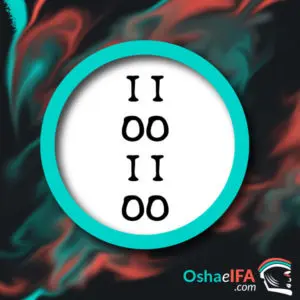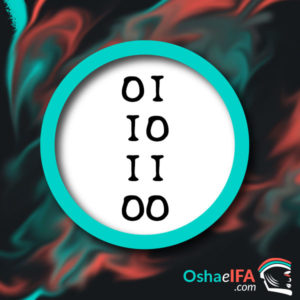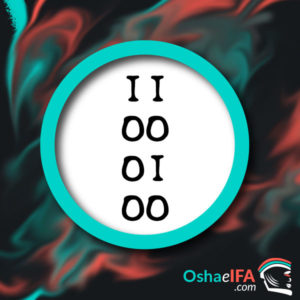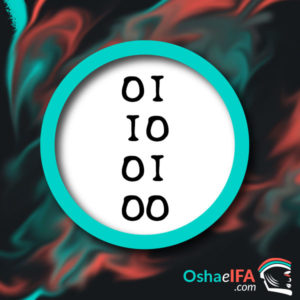Oshe Di

Oshe Di, is Odu #230 of the Lordly Order of Ifá. This sign invites us to reflect on calm in the face of collective confusion, suggesting that we should not get carried away by the panic of the crowd, but rather maintain serenity and act with discernment.
General Description of the Oshe Odi Sign
Names or Nicknames
- Oshe Odi.
- Oshe Di.
- Oshe Nishedi.
- Oshe Oddi.
What is born in the Oshe Di sign?
- The great dissatisfaction of women, where there is no man to accommodate her.
- Ebbó must be performed to be born and to die.
- Eshú Lalafan descended with this Oddun to Earth.
- Shangó puts a load of firewood on him that he cannot bear, nor can he take it away.
- You need to take care of your legs.
- The Eshú of this Oddun is Eshú Lalafan, and he is the one who cleans everything bad.
- A ball is prepared to throw at the enemy (Arayé) in his house.
- The person is the lamp of the street and the darkness of his house.
- It is prohibited to get wet with rainwater.
- The Ewé del Oddun is the winning stick.
- Impotence is mentioned in men and flow in women.
- The Toad and the Pig are the protagonists.
- You cannot be kind in the face of excesses.
- The thief is not forgiven.
- There is talk of a pregnant woman.
The Oshe Odi sign points out:
- Shango warned that money should not be used so much because with it death can come.
- You should not run when you see others running.
- There is talk of the scarcity of everything.
- The chicken, at birth, tilts its beak to the earth, but after it grows, it makes war on the one who gave it life.
- When adimú is offered to Oshún, it should also be offered to Yemayá.
- Yemayá is given pork.
- The woman commits robbery.
"He who owes and pays remains free" It teaches us about the liberation that comes with fulfilling our obligations. This sign underlines the importance of responsibility and integrity in financial interactions. Fulfilling our debts not only frees us from burdens, but also strengthens our character and relationships, keeping our honor intact.
Analysis and reflection of Odu Oshe Di:
Oshe Di emphasizes the importance of personal responsibility and the consequences of our actions. He warns about the great discontent that can arise when you are not satisfied with what you have, especially in relationships, and how this can lead to conflict and continued discontent.
Economic Aspects
The warning about greed and the need to manage an inheritance wisely underscores a fundamental principle: wealth must flow and be used with purpose and gratitude. The metaphor of "not calling money so much" highlights how the excessive desire to accumulate wealth can attract misfortune, reminding us that true value lies in how we use what we have to improve our lives and the lives of those around us.
"Salud"
Oshe Di talks about the physical consequences of emotional and spiritual neglect, such as impotence and reproductive problems. The reference to taking care of the legs symbolizes the need to keep moving, to move forward in life with firmness and purpose, preventing vices or carelessness from stopping us or diverting us from the path.
Religious Aspects
The presence of Eshu Lalafan, the cleanser of evil, emphasizes the importance of spiritual cleansing and protection against negative energies. This aspect invites reflection on how our actions and thoughts interact with the spiritual world, and the importance of maintaining a relationship of respect and care with the deities that guide and protect our lives.
Personal relationships
Oshe Di reflects on the complexity of intimate and family relationships. The phrase "the person is the lamp of the street and the darkness of his house" warns us about the importance of being consistent and true in all areas of our life, reminding us that the external brightness must correspond to the internal light, to build solid relationships. and significant.
Sayings of the Oshe Di Sign:
- The one who owes and pays, remains frank.
- Take care of yours first and then of others.
- Olodumáre loves all things, but not excesses.
- We must not accept the return of a defeated enemy.
«Take care of your own things first and then the things of others» It reminds us of the importance of self-management before trying to solve other people's problems. This saying emphasizes the need to set our foundations firmly, ensuring that our own needs and responsibilities are met, which puts us in a stronger position to assist others.
Ethical code:
- The Awó receives powers to overcome.
You can read: Oshun: Goddess of the River, Honey and Love
What does the Oshe Di sign talk about?
The Oshe sign addresses various dimensions of life and human relationships, highlighting the consequences of our actions and the importance of prudence and responsibility.
In the story where Eshú pours hot water on the pigs, later rejected by Yemayá, the impact of impulsive actions and the reactions of our spiritual environment towards them is highlighted. This story can be interpreted as a warning about the unintended consequences of thoughtless actions.
Oshe points out the accumulation of iron objects, a symbol of strength and resistance, but also of the burden of clinging to material things without considering their true value or the emotional cost that this entails.
This Odu of Ifa describes situations of financial and personal difficulty, such as that of a woman who pawns her belongings due to lack of financial support from her partner, which can lead to the loss not only of material goods but also of valuable relationships. This scenario is a call to value what we have and to manage resources with wisdom and gratitude.
Oshe Di predicts that after facing three great adversities, luck or blessing will come, reminding us that perseverance and faith through challenges are essential to achieve well-being.
The characterization of the person influenced by this Oddun as prejudiced, fickle, strong-willed, ungrateful and in constant need, warns about the need for introspection, personal growth and the cultivation of gratitude and the fixed word.
Finally, it speaks of the need to perform Ebbó for both birth and death, highlighting the importance of rituals in marking and honoring the fundamental transitions of existence, ensuring spiritual protection and balance in these crucial moments.
Meaning of the Oshe Sign di 5-7
The manifestation of female nonconformity highlights a mismatch between expectations and lived reality, highlighting the need for mutual understanding and support in relationships. The recommendation to wear the Oshún ileké and make specific offerings suggests that balance and resolution can be achieved through connection with and respect for the divine, particularly female deities who embody fertility and love.
The mention of the children of Ozayín represents the duality inherent in life, reminding us that within each being and situation there are both positive and negative aspects, and wisdom lies in recognizing and managing this duality. This sign also deals with parenthood and doubt, highlighting the importance of clarity and truth for family stability.
Shango warns about the danger of becoming obsessed with the accumulation of wealth, reminding us that true prosperity is found in balance and gratitude, not in greed.
Oshe Di (5-7) is an Odu that predicts scarcity and the need to perform Ebbó, highlighting the importance of rituals and concrete actions to overcome difficulties, showing that spiritual intervention is key to restoring abundance.
It is also alerted about the care that must be taken with a problematic neighbor, whose presence could generate conflicts. The saying about the chicken that, after being born, rebels against the one who gave it life, symbolizes the intergenerational conflicts that can arise.
Finally, this Odu emphasizes the importance of making offerings to both Oshún and Yemayá, recognizing the complementary role of both deities in the harmony and balance of life.
Recommendations
- Perform Ebó for Key Moments: It is essential to make Ebó both to be born and to die, emphasizing the importance of rituals in crucial moments of life.
- Leg Care: Maintain special attention to the health of the legs, since this Odu signals possible problems in this area.
- Spiritual Cleansing with Eshu Lalafan: Given this Eshu's ability to cleanse evil, it is recommended to work with him for spiritual purification, especially at midnight.
- Preparation against Enemies: It is advisable to prepare a ball with specific ingredients to throw at the enemy's house, as a protective measure.
- Maintain the Balance between the Exterior and the Interior: Making sure that the light we show to the world corresponds with the light we keep in our home.
- Thanks to Oshun and Yemaya: Make offerings to these deities when you receive the Odu, emphasizing gratitude and respect for them.
- Protection against Greed: Avoid greed, especially when facing conflicts that require financial investments.
prohibitions
- Avoid Getting Wet by Rainwater: This Odu specifies the prohibition of getting wet with rainwater as a measure of spiritual protection.
- Don't Ignore Money Warnings: It is prohibited to call money excessively and run after it, as a precaution against possible misfortunes.
- Don't Disregard Beliefs: It warns against skepticism towards Orunmila and other deities, highlighting the importance of faith and belief in oracles.
- Reject the Return of Defeated Enemies: This Odu advises against accepting enemies once they have been defeated, indicating the need to maintain distance from those who have shown hostility.
- Beware of High Temperatures and Electricity: Unnecessary exposure to risks such as fire and electricity, which could lead to accidents, is prohibited.
- Avoid Prejudicial and Aggressive Attitudes: Adopting prejudiced and aggressive behavior is discouraged, urging reflection and respect for others.
You can read: Ifa Odi she sign
Says Ifa Sign Oshe Di
In this Odu, the story of a person trapped in the whirlwind of emotions and circumstances that challenge his emotional and spiritual stability is told. He has been mourning the loss of an important woman in her life, although fate suggests a possible reunion and reconciliation. However, he is tempted by thoughts of revenge towards someone who has wronged him; It is crucial that he avoids such actions, as time will deliver justice.
Inside her home, news of a pregnancy looms that will bring with it doubts and revelations. In addition, he will face the complexity of relationships, upon discovering that a future couple is expecting a child from another man, a situation that he will eventually accept when understanding the truth behind paternity.
This Odu warns against greed and excessive materialism, pointing out that obsession with money could end up costing you dearly. Likewise, he highlights the importance of discretion and honesty; Hidden actions do not go unnoticed and can lead to unintended consequences.
The person's daily life reflects deep-rooted habits and the presence of deteriorated objects that could symbolize aspects of their life that need attention and repair. Despite his skepticism, he is reminded of his outstanding debt to Oshún, who has miraculously interceded in his life, emphasizing the deity's maternal and protective relationship with him.
You are alerted to potential dangers that may disrupt your peace, such as legal conflicts or emergency situations that require a quick response. Family and personal challenges underscore the need to develop firm speech and a more grateful and less volatile character.
Specifically for women, special care of the belly and consideration of possible medical interventions is advised. For men, the influence of certain sexual habits on their physical health and virility is raised, along with the warning about a friend or neighbor who could represent a destabilizing influence.
Ultimately, this Odu underscores the need to balance material concerns with spiritual commitment. The accumulation of earthly goods is no substitute for the strength provided by the connection with the divine. In the face of adversity, only those spiritually prepared will be able to face life's challenges with true resilience and wisdom.
Oshe Say in Ire:
- In this sign, a ball is prepared to be thrown at the enemy's house, composed of onion powder, tobacco ends, gunpowder and three guinea peppers.
- Shango has placed a load of firewood on the person so heavy that it is impossible to remove.
- The person depicted in this Odu shines in public but faces darkness at home.
- It is crucial to pay attention to conflicts with children.
- Oshe Di prohibits exposing yourself to the rain.
- It is time to prepare the work tools, since a period of intense work is approaching.
- Be careful with those who criticize, as they will eventually be forced to recognize your value.
Oshe Odi in Osogbo:
- This Oddun of Ifá prescribes offering a pig to Yemayá. The small animal is sacrificed at home without its blood being offered to any deity. After carefully peeling it with hot water, it is taken to the sea as an offering to Yemayá.
- In addition, the offering to Yemayá is complemented with pork rinds accompanied by green banana ladybugs.
- Greed forces a person to use their resources in unnecessary conflicts.
- Faith is challenged by doubt towards Ifá, limiting belief to a single deity.
- It is imperative to exercise caution with fire and high temperature liquids, as well as with electrical installations, to avoid accidents.
- Disbelief towards Orunmila leads to ruin.
- Self-sufficiency and contempt for others end in humiliation before those considered inferior.
Discover: What are Oshun's children like?
Prayer of the Odu Oshe Di Ifa:
Oshé Modi Mode Adifafún Obara Baniregun Ifá Nire Ifá Kaferefún Iyalordé, Orunmila, Shango, Eshú Atí Obiní.
Ebboses (Works) by Oshe Di (7-5):
To resolve problems with the law
The Ebbo of Oshe Odi to resolve problems with justice includes an offering to Eshú with the objective of obtaining his protection and favor in the face of legal adversities or trials. The components of this Ebbo are specially selected to influence circumstances in favor of the consultant, appealing to justice and seeking to reverse adverse situations.
Ebbo components:
- Rooster for Eshú: It symbolizes the direct offering to the orisha, seeking his intervention and support.
- House land: It represents the protection of the home and the personal connection with the consultant's living space.
- Enemy name: Customize Ebbo, focusing on overcoming specific obstacles or conflicts caused by third parties.
- Fresh fish: Offering that seeks to appease or satisfy the spiritual entities involved.
- Land of prison or place of trial: Element that establishes a direct link with the source of the problem, allowing the Ebbo to act more effectively.
- Smoked jutía and fish, corojo butter: Traditional ingredients in Yoruba rituals that serve as offerings to the orishas.
- Other ingredients and a lot of money: It refers to other elements necessary for the ritual and the monetary investment that symbolizes the sacrifice and seriousness of the request.
Work with Ball:
The creation of a ball composed of onion, tobacco end, etubón and three ataré, all crushed, is part of a strategy to influence the Arayé (enemy or adversary) by placing it at the entrance of his home, symbolizing the return or neutralization of the negativity sent.
For the war:
This part of the Ebbo is designed for more direct confrontations or conflicts, using a rooster, a drum, sixteen stones, traps, arrows, machete and knife, along with a lot of ashé (spiritual power) and money, to strengthen the consultant with protection, strength and resources necessary to overcome the battles you face.
This Ebbo reminds us of the importance of spiritual and material preparation in times of adversity, emphasizing faith in higher forces and personal action as means to overcome obstacles and restore harmony in our lives. Respectful and conscious interaction with the spiritual world, through rituals and offerings, is presented as a path towards conflict resolution and protection against injustice.
Pataki of the Oshe Di sign:
Rain of money, snails and guns
When Orunmila predicted rains of money, snails and then weapons, people marveled to see his predictions come true. First, they enthusiastically collected the money and the snails, wondering why Orunmila, despite his announcement, did not participate in the collection, calling him naive. However, when he predicted the fall of rifles and machetes, fear prevented people from going out to collect them, allowing Orunmila to monopolize all the weapons. Some time later, faced with the threat of war, the population found itself disarmed and in need, being forced to acquire weapons from Orunmila in exchange for the money and snails previously collected.
Explanation: History teaches us not to underestimate the wisdom or warnings of those who, because of their apparent inaction, we might consider naive or disinterested. Orunmila, with her foresight, reminds us of the importance of preparing for the future, understanding that not all opportunities present themselves with immediate benefits and that, sometimes, it is necessary to look beyond momentary gains to ensure our long-term well-being. term.
The Frog and the Pig
The Frog and the Pig were very different. The Toad, always bolder and freer than the Pig, used to win in all the competitions they had, also making fun of the fate of being eaten that the pigs had, unlike him. One day, the Pig challenged the Toad, claiming that he could run and swim better than him. The Toad, confident in his abilities to jump and swim in any water, rejected the idea of losing. The Pig, however, proposed a challenge for the next day, suggesting that the Toad find someone to teach him something valuable.
Following the Toad's advice, the Pig visited the Awó, who recommended that he demonstrate to the Toad the existence of a type of water unknown to him. Thus, the Pig prepared two containers, one with hot water and the other with cold water. Faced with the challenge, the Toad, bewildered by this new experience, jumped into the hot water and quickly realized his mistake, but it was too late.
Explanation: This story teaches us about the danger of arrogance and the importance of recognizing our limits. The Toad, overconfident in his abilities and underestimating those of the Pig, faced a situation for which he was not prepared, leading to his end. He highlights cunning and innovation as valuable resources over blind reliance on known abilities. He reminds us that there is always something new to learn and that overconfidence can blind us to unanticipated risks.
Oshe Di Ifa Traditional Nigerian
Isán nií sánrun
Òkàrá nií làrun gàgààgà
Òlùgbóngbó pajá mó je
Àwon ló día fún Olánlègè tíí sawo Owá
Ó ní Owá or làájé
Owá lajé
Ó ní Owá or làáya
Owá gbé òpòlopò Obínrin níyàwó
Ó ní Owá or bìímo
Owá bi òpòlopò omo
Ó ní Owá or kòólé
Owá kolé nlá
Ó lémìí Owá ó gùn
Owá gbélé ayé kanrin kése
Ó ní kí Owá ó rbo
Kó lòó tún ojú oórì baba è se
Kó mó baà rí baba è lójú ìran
Owá ni baba oun
Baba to you kú
Owa bako
Owá or rbo
Ngbà or sùn njó kan
Baba è bá yo si I lójú oorun
Ní bá n sunkún
Bàbá òun
Háà bàbá òun
Wón ni se bí wón wín fún o
Sebí ìwo loò gbébo n rúrú
Àyìn éyìn ní n yin àwon Babaláwo
Ó ní Isán níí sánrun
Òkàrá nií làrun gàgààgà
Òlùgbóngbó pajá mó je
Àwon ló día fún Olánlègè tíí sawo Owá
Ó ní Owá or làájé
Owá lajé
Ó ní Owá or làáya
Owá laya
Ó ni yoó bimo
Owá bimo
Ó ní yóó rìí baba è lójú ìran
Owá ní baba to ti kú
Bóo lòun or did you laugh baba òun lójú ìran?
Owá wáá ri baba è lójú ìran
O lè seni ká e lájé
Olánlegè
Or mò read seni ò
Olánlegè
O lè seni ká e laya
Olánlegè
Or mò read seni ò
Olánlegè
O lè seni ká e bimo
Olánlegè
Or mò read seni ò
Olánlegè
O lè seni ká e kólé
Olánlegè
Or mò read seni ò
Olánlegè
O wáá leè seni títíítí ká e rí baba eni
Olánlegè
Or mò read seni ò
Olanlegè.
Ifá says in Oshe Di, that this person must take care of his / her priest / s. All the predictions of his priests will come to pass. If the father is alive, he must offer his Orí, but if he is dead, he must ask what his father accepts from him.
Isán nií sánrun
Òkàrá nií làrun gàgààgà
Òlùgbóngbó pajá mó je
They were the ones who made divination for Olánlègè, the priest of Owá
He predicted that Owá will have wives
Owá married many women
He predicted that Owá would have many children
Owá had twins and triplets as children
He said Owá will build a house
Owá built a mansion
He said owá will live a long time
And Owá grew old
He advised Owá to offer sacrifice
And that he must go to take care of his father's grave
So that he does not see his father in nightmares
Owá asked with some doubt 'My father?'
'The man who passed away years ago'
Owá refused
He didn't make the sacrifice
One day he was sleeping
And in his dream his father appeared
And I was like I was crying
He sobbing said: 'My father'
'Oh my father'
'Didn't we tell you?'
'Weren't you the one who refused to make the sacrifice?'
He belatedly began to praise his Babaláwos
He said Isán níí sánrun
Òkàrá nií làrun gàgààgà
Òlùgbóngbó pajá mó je
They were the ones who made divination for Olánlègè, the priest of Owá
He predicted that Owá will have riches
And it happened
He predicted that Owá will have wives
Owá had wives
He predicted that Owá would have children
Owá had twins
He said that Owá would see his father in his dreams
Owá said 'The man who died years ago'
'How will I see my father in dreams?'
Shortly afterwards Owá saw his father while he was sleeping
So can you make it possible for one to have wealth?
Olánlegè
You really can make it possible
Olánlegè
You can make it possible for one to have wives
Olánlegè
You really can make it possible
Olánlegè
You can make it possible for one to have children
Olánlegè
You really can make it possible
Olánlegè
You can make it possible for one to build a house
Olánlegè
You really can make it possible
Olánlegè
You can make it possible for you to see your father while you sleep
Olánlegè
You really can make it possible
Olanlegè.
Eshu from Oshe Odi: Lalafan
Eshu Lalafan, specializes in purification and elimination of negative energies. This powerful Eshu exercises his work specifically at midnight, a time when his influence and ability to cleanse intensify.
Represented by a figure wrapped in mariwó, Eshu Lalafan is distinguished by its unique cargo, which includes a dead man's bone and earth collected from seven graves at midnight, among other essential components for Eshu. This spiritual entity receives offerings of rooster and dove, highlighting its deep connection with ritual sacrifices.
It is essential for those who worship him to keep a small bag full of ingredients nearby, symbolizing sustenance and the continuous link with this powerful guardian. Eshu Lalafan, therefore, not only acts as a protector against evil, but also ensures balance and harmony for those who follow him.















To all, Blessings and wisdom with humility 😌!
What is the path of ochun in oshe di
I would like to know more because it is not complete here and I am oshe found guardian angel Oggún